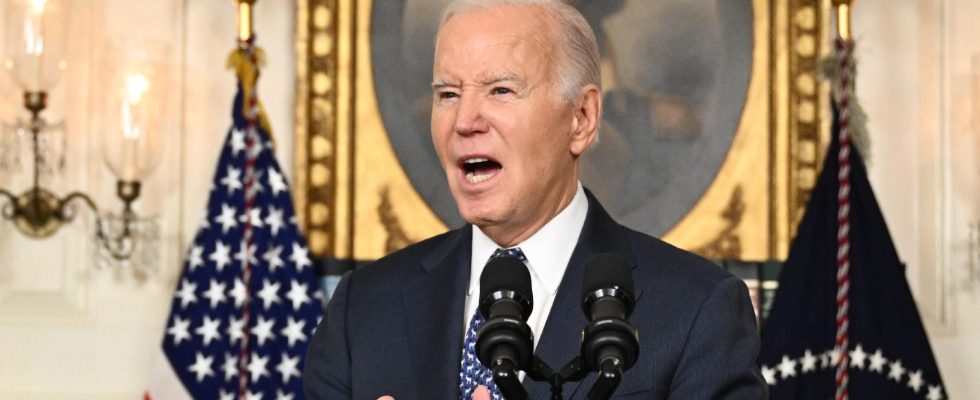That evening, in Jerusalem, they dance to the idea of ethnic cleansing, and Itamar Ben-Gvir, the sulphurous Israeli Minister of National Security, is the king of the party. On January 28, several thousand people and around ten ministers gathered to celebrate their plan to “recolonize” the Gaza Strip, while the war rages in the Palestinian enclave. Like Ben-Gvir, four other ministers in Netanyahu’s government live in settlements in the West Bank, in defiance of international law. Their extreme speech, although rejected by the Israeli authorities, makes negotiations with the Palestinian camp almost impossible.
Obstacles to peace
In Washington, the Biden administration has identified this most radical fringe of the Israeli government as the main obstacle to a cease-fire, not to mention possible peace negotiations with the Palestinians. Joe Biden knows that Benjamin Netanyahu cannot do without these far-right ministers in his coalition, under penalty of losing power. The American president also knows that any attempt to interfere in Israeli domestic politics could turn against him.
“The Biden administration is showing increasingly obvious signs of annoyance with Israel, but it continues to work discreetly, behind the scenes, without activating the massive levers at its disposal,” underlines Aaron David Miller, who knows by heart the pitfalls of American policy towards Israel. This former Middle East adviser worked for two administrations, under George Bush Senior and Bill Clinton, which attempted to interfere in Israeli politics. “Each time, it was a total failure,” laughs the ex-diplomat today. He has bitter memories of the 1996 election in Israel, when Bill Clinton invited Shimon Peres to the White House a month before the vote: “It came back to us in the face, Netanyahu used it in the campaign and he was elected Prime Minister for the first time… We Americans are really bad at intervening in the Israeli domestic scene.”
The equation of the moment proves particularly complex for Biden, who must also face the verdict of the polls in November. And the war in the Gaza Strip is making him lose points, whatever he does: the left of the Democratic Party criticizes him for his laxity in the face of Israeli bombings against civilians, when Donald Trump promises to support Israel even more in the destruction of the Gaza Strip. Hamas if he is elected. “When he was vice-president, Biden watched Obama clash with Netanyahu, without success, and what’s more, he has no desire to appear anti-Israel before the presidential election, says Joe Macaron, Middle East expert at the Wilson Center. He wants to gently nudge Netanyahu to change his position, but that can’t work since their interests simply aren’t aligned.”
Despite the political impasse, Joe Biden does not remain without resources. On February 1, he signed a presidential decree sanctioning “anyone compromising peace, security and stability in the West Bank”, in other words Israeli settlers guilty of violence against Palestinians. At the first reading of the American decree, the colonists shrugged their shoulders and joked, believing themselves to be protected from decisions taken on the other side of the Atlantic. But four of them have already seen their accounts frozen, Israeli banks following orders from the American government. “This is an important signal sent by President Biden, suggests Steven A. Cook, Middle East specialist at the Council on Foreign Relations, in Washington. After standing as close as possible to Israel in its war in Gaza, the United States signals that it is time to think about the day after and that it under no circumstances wants to return to the status quo. The Biden administration is pushing for a big diplomatic coup and signaling that it recognizes that Palestinians are threatened by settlers, who are encouraged and protected by Israeli ministers.”
For an Israeli minister, American sanctions are “an anti-Semitic campaign”
Three days after the signing of the American decree, Itamar Ben-Gvir shouted his anger in the Wall Street Journal, directly attacking the American president. Unheard of for a serving Israeli minister. “Instead of supporting us 100%, Biden is too busy providing humanitarian aid and fuel [à Gaza], then everything is recovered by Hamas, the Minister of National Security tells the New York newspaper. If Trump were in power, the United States would behave completely differently.” The Minister of Finance, Bezalel Smotrich, also a West Bank settler, took action by describing the American sanctions as an “anti-Semitic campaign”. Faced with these outings, unanimously criticized by the Israeli political class, Netanyahu was forced to reiterate that he “did not need help to manage Israel’s relations with the United States”, without taking sanctions against his troublesome allies.
In recent days, the American press has reported Biden’s growing frustration with Netanyahu, whom he is said to have described as a “f***ing bad guy” in private, according to Politico. Then, on February 8, while the Israeli government announced the preparation of its offensive on Rafah, where 1.3 million Palestinians are massed, the American president lost his cool at the White House, believing in public that Israel had “exceeded the limits” in the Gaza Strip. “Many innocent people are starving, many innocent people are getting into trouble and dying,” Joe Biden said. “This must stop!”
For the moment, however, there is no question for the American administration of withdrawing its support for the Israeli offensive in the Gaza Strip or of limiting its military aid. “On the Israeli issue, Biden is losing a lot of his credibility in foreign policy, believes Joe Macaron, of the Wilson Center. It is a real test of leadership for him, regardless of the outcome of this war: he must clearly say which direction “The United States wants to take action on this issue, which it has not been able to do in recent weeks.” Like Israel, Biden finds himself trapped in Gaza.
.
